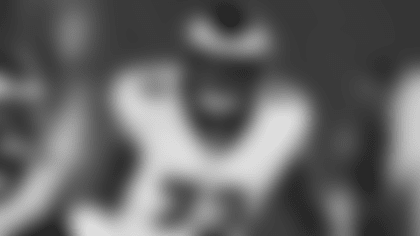Step one has been accomplished, but the 2013 Eagles are far from satisfied. After securing a playoff berth with last week's tension-filled division battle in Dallas, the Eagles now turn their attention to the New Orleans Saints for the franchise's first playoff game in three seasons. In his first season as head coach, Chip Kelly led the Eagles to wins in seven of their final eight regular season games. Now, he welcomes in a former Super Bowl-winning head coach to Lincoln Financial Field for a third straight primetime contest in front of what will surely be a raucous Lincoln Financial Field crowd.
At 11-5, the Saints have returned to form after Sean Payton's one-year suspension. Thanks in large part to Drew Brees, New Orleans once again has one of the league's top offenses. The Saints average 5.9 yards per play, fifth-best in the league (the Eagles rank second at 6.3), but they've also taken a big step forward defensively. In fact, at 19 points allowed per game, the Saints have jumped all the way to the fourth-best scoring defense in the league after finishing 31st in the category in 2012. For the Saints, though, the end of season disappointment came in ceding the NFC South title to the Carolina Panthers, leading to a Wild Card Round road game. In their history, the Saints have never won a road playoff game, something that is probably more of a nuisance than anything. Still, with early forecasts for Saturday night calling for temperatures around 20 degrees, the Saints will have to prove they can handle the conditions – something the Eagles have already proven this season.
Playoff History:
January 23, 2007 – NFC Division Round
Saints 27, Eagles 24
It was only fitting that the Eagles experienced a case of déjà vu in New Orleans as the Saints beat the Eagles 27-24 -- the same exact score of their meeting earlier in the regular season. The only difference is that this one ended the Eagles' season, which was initially saved by quarterback Jeff Garcia, who led the Eagles to six straight wins including a Wild Card round victory over the Giants after Donovan McNabb tore his ACL.
The game opened with a bang as cornerback Sheldon Brown leveled running back Reggie Bush in one of the more memorable hits in Eagles history. But Bush, a rookie No. 2 overall pick at the time, would have the last laugh. Bush scored on a 4-yard touchdown run in the first half and Deuce McAllister became the first Saints player to rush for over 100 yards in a playoff game, gaining 143 and scoring on a 5-yard touchdown run and an 11-yard touchdown reception in the third quarter.
The Eagles attempted a comeback effort late and had converted a fourth-and-5 from near midfield only to have it nullified by a Scott Young false start penalty. Young was in the game for an injured Shawn Andrews. The Eagles punted on fourth-and-15 and never got the ball back.
January 3, 1993 – NFC Wild Card Round
Eagles 36, Saints 20
The Eagles notched their first road playoff win in 44 years as Randall Cunningham hit Fred Barnett for touchdown passes of 57 and 35 yards in the come-from-behind victory. Trailing 20-10 heading into the fourth quarter, the Eagles exploded for 26 unanswered points in the final stanza to secure the victory.
Cunningham finished 19-of-35 for 219 yards and two touchdowns while Heath Sherman rushed for 105 yards on 21 carries. The vaunted Eagles defense picked off Bobby Hebert three times, two of them from Eric Allen, who closed out the game with an 18-yard interception return for a touchdown.
When The Eagles Have The Ball:
The Eagles finished their first season under Chip Kelly as the second-ranked offense in the NFL in terms of yards per game (417.3). They boasted the premier rushing attack in the league, gaining a remarkable 160.4 rushing yards per game and 5.1 yards per carry. They averaged 27.6 points per game (fourth in the league) and set a number of franchise records as far as offense is concerned. Now, though, all of those numbers are thrown right out the window. In the playoffs, it's all about finding a way to win games.
The Saints, meanwhile, have been very impressive on the defensive side of the ball under coordinator Rob Ryan. The one area in which they are a bit below average, though, is run defense. A top-five defense in almost every other category, New Orleans ranks 19th in rushing yards allowed, giving up 111.4 rushing yards per game. A healthy diet of LeSean McCoy, Bryce Brown and Chris Polk could be just what the doctor orders for the Eagles as they look to advance to the Divisional round. McCoy cemented himself as the most elusive back in the game this season, finishing with a league-best 1,607 rushing yards, 134 more than New Orleans had as a team. The Saints have allowed more than 125 rushing yards in six games this season. The Eagles exceeded that number on 10 occasions this season.
Linebacker Curtis Lofton has stepped up and become a major factor in his second season in the Big Easy. He leads the Saints in total tackles with 125 and will be a big factor in New Orleans' efforts to stop the run, as will the three-man front of Akiem Hicks, Brodrick Bunkley and Cameron Jordan. With Ryan calling the plays, the Saints love to bring pressure, and as a result, they have gotten to opposing quarterbacks 49 times this season, fourth most in the NFL. But perhaps Kelly and offensive coordinator Pat Shurmur can use that aggressiveness against them. The Eagles' ability to be effective with draws and screen plays could be a very big part of Saturday night's game.
The Saints possess one of the best pass defenses in the NFL, allowing just 194.1 passing yards per game. However, the recent loss of rookie safety Kenny Vaccaro, among the unit's very best players already, changes things for the Saints. Vaccaro was third on the team with 77 total tackles on the season before suffering a season-ending ankle injury against the Carolina Panthers in Week. At the cornerback position, five-year veteran Keenan Lewis leads the team with four interceptions, but Vaccaro's absence takes away that hard-hitting presence at the back line of the defense. The Saints current starting safety duo of Roman Harper and Malcolm Jenkins have a combined 13 years of NFL experience, but the big question is whether or not they'll be able to keep the Eagles' speedy playmakers in front of them.
Foles' numbers from last week's win-and-in game against Dallas weren't very flashy. He completed 17-of-26 passes for 263 yards and two touchdowns, and while his passer rating of 124.4 was low compared to some of his incredible performances from previous games, Foles did exactly what the Eagles needed him to do. The running game was moving the ball, so Foles was not called on to take over the game. He complimented the run game perfectly, was solid when using play-action, and was once again smart with the football. The Saints are near the bottom of the league when it comes to takeaways, and that bodes well for Foles and the offense. On the season, New Orleans has created just 19 takeaways, the fourth-fewest total in the NFL. The Eagles have been one of the league's best when it comes to turnover differential ( 12), and winning the turnover battle will once again be key.
When the Eagles and Saints met last season in New Orleans, three Eagles receivers had nice games. DeSean Jackson hauled in only three passes, but one of them was a 77-yard score. Jason Avant had six catches for 56 yards, and Brent Celek had five grabs for 47 yards. Riley Cooper did not have a catch, and was targeted just once. Fans may remember Cooper laying down in the end zone before popping up to take a lateral from Brandon Boykin 94 yards for a kick return touchdown. The score was nullified because of a forward lateral ruling, but that was really the only time that Cooper was a factor. Expect that that to change on Saturday. Cooper had a couple of big catches last week against Dallas, but he's only found the end zone once in the last six games. Both of the Saints' starting cornerbacks (Lewis and Corey White) are listed at 6-foot-1, so the 6-foot-3 Cooper has the clear height advantage. The Eagles could look to their big targets like Cooper, Celek and Zach Ertz often. At 6-foot-5, Ertz presents a very tough matchup. For the past few seasons, the Saints have been giving opposing teams fits with tight end Jimmy Graham, who has the size of a tight end and the athleticism of a wide receiver. Maybe it's time for the Eagles to give the Saints a taste of their own medicine by making Ertz a big part of the game plan.
As many fans are aware, the Saints are a different team on the road. They went 8-0 at home this season, but just 3-5 on the road. In their five road losses, they've given up an average of 26.8 points per game, which is roughly eight points higher than their season average of 19.0 points allowed per game. The early forecast for Saturday calls for a high of 30 degrees and a low of 18 degrees, with wind chills near zero. There is not precipitation in the forecast, but the cold weather could impact how effective the quarterbacks are at throwing the football. If the conditions lead to a ground-and-pound-type game, the advantage goes to the Eagles.

When The Saints Have The Ball:
Ever since Sean Payton and Drew Brees joined the New Orleans Saints in 2006, the franchise has been defined by its explosive passing attack and prolific offense. The 2013 regular season was no different, as the Saints ranked fourth in the NFL in total offense at 399.4 yards per game, tied for fourth with 5.9 yards per play and fourth with 25.9 offensive points scored per game. In addition to their gaudy statistics, the Saints are a methodical operation on offense that values controlling the clock and grinding out long drives. At 32:41, they rank second in the NFL in time of possession, a stark contrast to the Eagles offense, which ranks last at 26:24.
Brees notched his eighth straight season with over 4,000 yards passing and his third season with over 5,000 passing yards, finishing with 5,162, a mark that trailed only Peyton Manning's record 5,477. He directs the league's second-ranked passing attack, averaging 307.4 yards per game. Brees threw for 39 touchdowns to just 12 interceptions and was second to Phillip Rivers with a 68.6 completion percentage. His 104.7 quarterback rating was fifth best in the NFL and his third best as a member of the Saints. Simply put, Brees remains among the elite signal callers in the NFL and poses the biggest challenge the Eagles defense has faced since going against Peyton Manning.
The main weapons in the passing game are superstar Jimmy Graham and veteran stalwart Marques Colston. Graham, by far Brees' favorite target, perhaps sparked the trend of evolutionary tight ends that has swept the NFL. At 6-foot-7 and 265 pounds, the former college basketball player is a rare combination of size and athleticism and is a matchup nightmare for opposing defenses. He is the best red-zone threat in the league and on the season has 86 catches for 1,215 and 16 touchdowns. Though listed as a tight end, Graham plays most of his snaps lined up as a wide receiver either in the slot or outside the numbers and is one of the NFL's most dynamic pass-catching weapons. Though it is not a typical schematic tendency for Bill Davis, it will be interesting to see if he assigns Cary Williams or Bradley Fletcher, given their size and movement skills, to stick on Graham and cover him exclusively. The New England Patriots did this to perfection with Aqib Talib, who held Graham without a catch.
Colston is as steady as they come at the wide receiver position and has a special, seemingly telepathic rapport with Brees. His height (6-foot-4), length, body control and jumping ability all make him dangerous because Brees will throw him the ball even when he's covered, asking Colton to go up and make a play. Colston finished the season with 75 catches for 943 yards and five touchdowns. In five career games against the Eagles, he has 24 catches for 255 yards and four touchdowns (including five catches for 55 yards in the 2006 Divisional Playoff).
Lance Moore, who like Colston has been with the Saints since 2006, is another constant and serves as a nice receiver for Brees. Robert Meachem rejoined the team after being released by the San Diego Chargers and is another option. The two have combined for 53 catches for 781 yards and four touchdowns. Rookie Kenny Stills is the deep threat who stretches the field and burns defenses with his speed. He leads the NFL with 20.0 yards per reception and has 32 catches for 641 yards and five touchdowns on the season. Though his season high is just four catches, Stills has had four games with a reception of 50 yards or more.
In the past, Payton and the Saints have shown a healthy commitment to the run and prefer to employ a balanced attack. The run game has been a weakness this season, however, ranking 25th in the league at 92.1 yards per game on 3.8 yards per carry. Four running backs share the load in Pierre Thomas (primary), Mark Ingram, Khiry Robinson and Darren Sproles. Ingram has the highest yards per carry (4.9), while Thomas and Sproles are bigger threats as receivers out of the backfield with 77 catches for 513 yards and three touchdowns and 71 catches for 604 yards and two touchdowns, respectively.
The Saints offensive line has given up 37 sacks on the season, which, though it's tied for eighth-fewest in the NFL, is the most times Brees has been sacked since joining the team in 2006. The line has been plagued by inconsistent play, especially at left tackle, where rookie Terron Armstead was recently installed to replace Charlie Brown to protect Brees' blindside. Right guard Jahri Evans, the Philadelphia native, is the line's veteran mainstay, now in his eighth season with the franchise. Obviously, going up against Brees and the NFL's second-ranked passing offense will be the main focus in this matchup. The Saints figure to move the ball, but the Eagles defense will have to rely on its bend-but-don't-break identity to limit scoring opportunities. Of note is that the Saints offense ranks 12th in the league in red-zone touchdown efficiency at 56.14 percent, while the Eagles also rank 12th in that category at 52.06 percent.
Mychal Kendricks lived up to his billing as a playmaker against the Cowboys and had perhaps his best game of the season with 12 total tackles, a forced fumble and an interception. He was lightning quick to the ball and made a number of key solo tackles to limit yardage. Connor Barwin also had a standout game, executing his "Jack" responsibilities flawlessly and coming up with a huge play on fourth-and-1 in the fourth quarter to bat down Kyle Orton's pass and halt the Cowboys' drive.
There is no question, though, that the Eagles' front seven will have to generate much more pressure against Brees than it did against Orton in order to have success. A week after smothering the Chicago Bears offensive line and sacking Jay Cutler five times, the Eagles got zero on Orton and barely hurried him at all. Brees is deadly against the blitz, so it will be imperative for Fletcher Cox, Bennie Logan, Cedric Thornton and Trent Cole to get there on four-man rushes and at least make the quarterback uncomfortable in the pocket.
As previously alluded to, Williams and Fletcher could see time covering Graham. If that is not the case, Davis' plan to contain the Saints monster receiver and how effectively it works could be what decides the game. Brandon Boykin, who is second in the NFL with six interceptions and made the his second game-sealing pick of the season to vanquish the Cowboys and secure the NFC East title, will remain at his slot position and likely see a lot of Stills. Earl Wolff's status is still uncertain because of a knee injury, and if he cannot play then Nate Allen and Patrick Chung will be the starting safety duo for a second straight game.






















